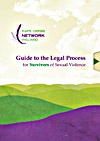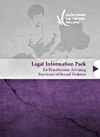Are you safe now? If not, you may need to ask for help.
You do not need to make any decisions now about reporting the assault to the Gardaí or PSNI but it is a good idea to leave your options open. Here are some points to remember:
- Contact your local Rape Crisis Centre as soon as possible. A staff member will give you the information you need to help you make your decisions about what happens next and to support you in whatever you decide to do. This will include information about your nearest specialist Sexual Assault Treatment Unit (SATU) or PSNI Rape Suite.
- You can ask a friend to contact the Rape Crisis Centre for you or ask a friend to come with you.
- If you decide you might want to report the rape or sexual assault to the police, do not wash until after you have had a medical and forensic examination because important forensic evidence might be washed away.
- If you were attacked in your mouth and you want to report it, don’t eat, drink, smoke or use toothpaste or mouthwash until samples have been taken from your mouth area.
- Do not throw out or wash underwear or clothes that you were wearing at the time of the assault as these will be needed for forensic examination.
Is what I am feeling normal?
People react in different ways to being raped or sexually abused. There is no such thing as a ‘typical reaction’
Your reactions may include the following:
Immediate effects
Shock and withdrawal, panic and confusion, terror, disbelief and denial, feeling dirty, distressed, crying and shaking, calm and detached.
Short-term effects
Thinking constantly about the details of the rape, getting flashbacks, finding it hard to sleep and having nightmares, being jumpy, obsessive washing, physical trauma.
Long-term effects
Dramatic mood-swings, repeated flashbacks about the assault, blaming yourself, guilt, fear, deep emotional pain, difficulty in trusting, difficulty in building new relationships, sexual difficulties, poor concentration and memory, difficulty coping with normal routines.
IF YOU HAVE BEEN RAPED OR SEXUALLY ASSAULTED, SUPPORT CAN HELP YOU RECOVER
Medical Care and Forensic Attention
You may be reluctant to see a doctor after a sexual assault but there are good reasons for doing so
- You may have internal or external injuries that need attention.
- You need to be tested for sexually transmitted infections.
- You may be pregnant and need to know your options.
- You may want evidence gathered in case you decide to report the rape or sexual assault. Reporting may involve a medical and forensic examination.
- You may want support when going for medical help. You could ask a friend or relative, or contact your nearest Rape Crisis Centre and a staff member will go with you.
Who should I see?
You may want to see your own family doctor (GP). However, if you are reporting or thinking about reporting the assault to the police, the doctor or nurse who examines you might need to appear in court to give the medical and forensic evidence and it is better that she or he has training and experience in this.
Your local Rape Crisis Centre can tell you about the nearest centre or doctor that specialises in medical and forensic examinations. This will be:
- a Sexual Assault Treatment Unit (SATU) if the assault happened in the Republic of Ireland,
- a PSNI Rape Crime Unit if the assault happened in Northern Ireland. The PSNI Rape Crime Unit would normally take you to the nearest Rape Suite for medical and forensic examination,
- an experienced doctor, if a SATU or PSNI Rape Suite is not available.
Map of Sexual Assault Treatment Units (SATUs)
A forensic examination
In a forensic examination, a specially trained doctor or nurse will collect evidence from your body that may be used to prosecute the person who assaulted you. Doctors and nurses in Sexual Assault Treatment Units and Rape Suites are trained to collect the forensic evidence and to testify about that evidence in court, if necessary.
In Republic of Ireland: If you do not wish to make a formal statement about the crime to the police immediately, you may ask for the forensic samples to be stored by the SATU for up to a year so that you have more time to make up your mind about whether you want to go ahead with reporting. This is known as the “3rd Option” or “storage of evidence”.
The doctor or nurse will also examine you to make sure that you are alright. If you have any injuries that need immediate care, you will get medical treatment before the forensic examination. If you wish, a staff member from the Rape Crisis Centre can be with you during the examination.
Reporting to the Police
The staff in your local Rape Crisis Centre will give you, or help you to get, all the information you need so that you can decide whether to report the assault to the police or not. If you decide to go to the police, we can arrange this for you. An Garda Síochána is the police force in the Republic of Ireland. The Police Service of Northern Ireland (PSNI) is the police force in Northern Ireland. If you prefer, you can give your statement to the police in the Rape Crisis Centre rather than at the police station.
If you decide to go to the police, the following information will help you:
- Bring someone you feel comfortable with. You have the right to have them stay with you. If they are present while your statement is taken, their details need to be included and they may be called as witnesses. For this reason, the police may ask that they sit outside for the actual taking of the statement. However, if you want the person to be present, you can insist on it.
- Make a note of the names of any police officers or detectives you have significant contact with from the time you first report the rape or assault.
THE POLICE HAVE A DUTY TO KEEP YOU INFORMED OF THE PROGRESS OF YOUR CASE
- You may ask to speak to a female police officer, if you prefer.
- If you are reporting a recent assault, take a full change of clothes with you as the police may keep the clothes you were wearing to gather forensic evidence.
- Do not take any alcohol or drugs, but if you have done so or are still under the influence this should not stop you from reporting.
- If reporting an assault or rape, report it as soon as possible. There is no time limit but valuable forensic evidence is quickly lost.
- The police will ask you a lot of questions but these should be relevant to your case.
- You can ask for a break at any time.
- You will be asked to make a written statement. This is a detailed description of what happened before, during and after the assault. Make sure you read your statement carefully and change it if necessary, before you sign it. You have the right to, and should ask for, a typed copy. If you remember other details later on, you can make a supplementary statement.
- If the person who assaulted you can be identified, the police may interview them soon after you make your statement.
- If don’t know the person who assaulted you and the police arrest a suspect, they may ask you to look at photographs, attend an identity parade or go with police to where the assault happened to try to identify the person.
If you feel you are not being treated well by the police at any stage, you can insist on seeing the duty officer or you can make a formal complaint.

 Guide to the Legal Process for Survivors of Sexual Violence
Guide to the Legal Process for Survivors of Sexual Violence Legal Information Pack for Practitioners Advising Survivors of Sexual Violence
Legal Information Pack for Practitioners Advising Survivors of Sexual Violence